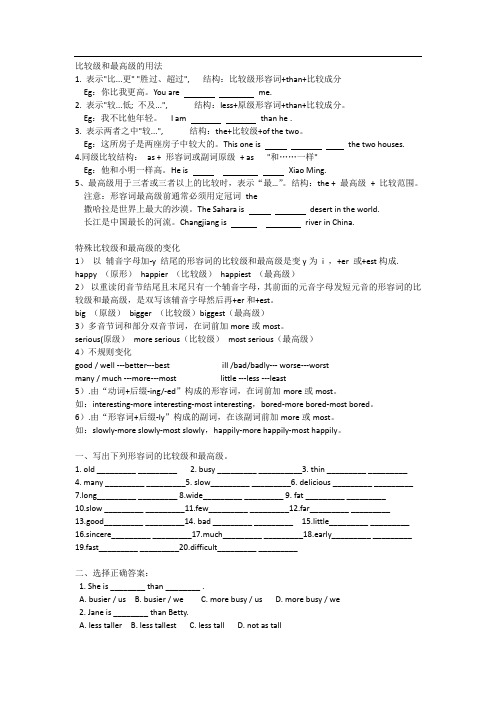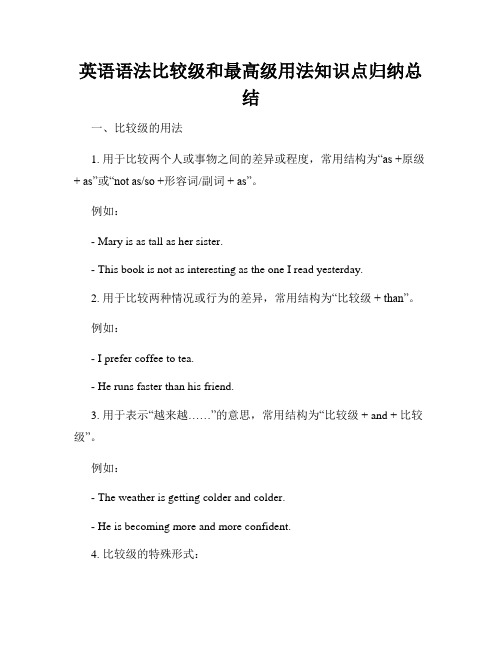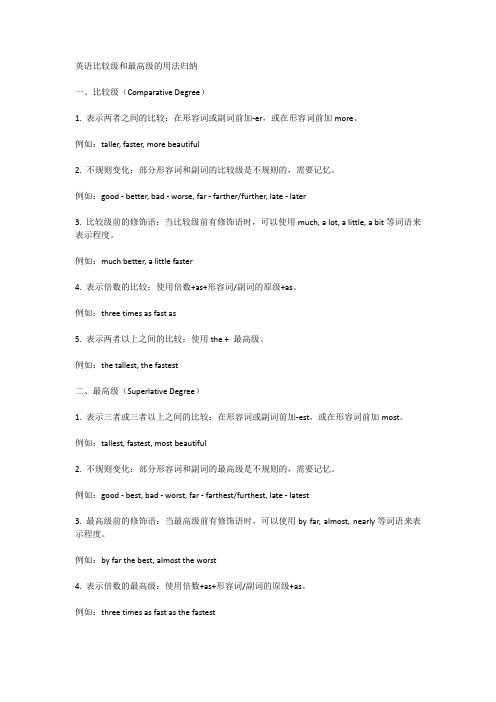初中英语比较级最高级用法过去式过去分词用法
初中英语知识点归纳比较级与最高级

初中英语知识点归纳比较级与最高级初中英语知识点归纳——比较级与最高级比较级与最高级是英语中常用的两种形式,用于比较事物的高低、程度的深浅等。
在初中英语学习中,比较级与最高级是基础而又重要的知识点。
本文将对比较级与最高级的用法进行归纳总结,帮助初中生更好地掌握这一知识点。
1. 比较级的构成比较级的构成通常是在形容词、副词前加上"-er"或在单音节词和部分双音节词前加上"more"。
例如:- 肥胖的→ fatter (形容词比较级)- 快速地→ faster (副词比较级)- 勤奋的→ more diligent (形容词比较级)- 温和的→ more gentle (形容词比较级)2. 比较级的用法(1)表示两者之间的比较。
通常在比较级前加上"than",表示某一方面的差别。
例如:- 我的狗比你的狗更大。
- My dog is bigger than your dog.(2)表示不同事物的比较。
常用的句型是:"A + be + 比较级 + than + B"。
例如:- 玫瑰花比郁金香更漂亮。
- Roses are more beautiful than tulips.(3)表示喜好或建议。
常用的句型是:"prefer + 比较级 (to + 比较对象)"。
例如:- 我喜欢喝茶胜过喝咖啡。
- I prefer tea to coffee.3. 最高级的构成最高级的构成通常是在形容词、副词前加上"-est"或在单音节词和部分双音节词前加上"most"。
例如:- 肥胖的→ fattest (形容词最高级)- 快速地→ fastest (副词最高级)- 勤奋的→ most diligent (形容词最高级)- 温和的→ most gentle (形容词最高级)4. 最高级的用法(1)表示三者或三者以上的比较。
人教版初中英语各册主要语法

人教版初中英语各册主要语法人教版初中英语教材的各册主要涵盖了以下语法内容:初一上册:1.一般现在时:动词的基本形式,表示经常性或习惯性的动作。
2.be动词:am/is/are,用于句子的肯定、否定和疑问形式。
3.人称代词:I, you, he, she, it, we, they。
4.形容词的比较级与最高级:-er/-est或more/most,用于比较事物的大小、程度等。
5.数词:基数词和序数词的用法。
初一下册:1.一般过去时:动词的过去式形式,表示过去发生的动作或状态。
2.现在进行时:be动词+动词-ing形式,表示正在进行的动作。
3.可数名词与不可数名词:区分可数和不可数名词的概念及其用法。
4.表示位置的介词:in, on, under, behind等,用于描述物体的位置关系。
5.物主代词:my, your, his, her, its, our, their。
初二上册:1.一般将来时:will/shall + 动词原形,表示将来的动作或状态。
2.一般现在时与现在进行时的区别:表达现在状态或习惯的一般现在时,和表示正在进行的动作的现在进行时。
3.动词不定式:to + 动词原形,用于表示目的、愿望、能力等。
4.情态动词can与may:表示能力、许可、请求等。
5.介词短语:表示时间、地点等。
初二下册:1.现在完成时:have/has + 过去分词,表示过去发生的动作对现在造成的影响或结果。
2.过去进行时:was/were + 动词-ing形式,表示过去某一时刻正在进行的动作。
3.定语从句:用于修饰名词的从句。
4.形容词性物主代词与名词性物主代词的区别:my/mine, your/yours, his/his, her/hers, its/its, our/ours, their/theirs。
5.反意疑问句:表示征求对方意见或确认自己观点的句型。
初三上册:1.现在完成进行时:have/has been + 动词-ing形式,表示从过去开始一直持续到现在的动作。
初中英语比较级最高级用法过去式过去分词用法

比较级和最高级的用法1. 表示"比...更" "胜过、超过", 结构:比较级形容词+than+比较成分Eg:你比我更高。
You are me.2. 表示"较...低; 不及...", 结构:less+原级形容词+than+比较成分。
Eg:我不比他年轻。
I am than he .3. 表示两者之中"较...", 结构:the+比较级+of the two。
Eg:这所房子是两座房子中较大的。
This one is the two houses. 4.同级比较结构:as + 形容词或副词原级+ as "和……一样"Eg:他和小明一样高。
He is Xiao Ming.5、最高级用于三者或三者以上的比较时,表示“最…”。
结构:the + 最高级+ 比较范围。
注意:形容词最高级前通常必须用定冠词the撒哈拉是世界上最大的沙漠。
The Sahara is desert in the world.长江是中国最长的河流。
Changjiang is river in China.特殊比较级和最高级的变化1)以辅音字母加-y 结尾的形容词的比较级和最高级是变y为i ,+er 或+est构成. happy (原形)happier (比较级)happiest (最高级)2)以重读闭音节结尾且末尾只有一个辅音字母,其前面的元音字母发短元音的形容词的比较级和最高级,是双写该辅音字母然后再+er和+est。
big (原级)bigger (比较级)biggest(最高级)3)多音节词和部分双音节词,在词前加more或most。
serious(原级)more serious(比较级)most serious(最高级)4)不规则变化good / well ---better---best ill /bad/badly--- worse---worstmany / much ---more---most little ---less ---least5).由“动词+后缀-ing/-ed”构成的形容词,在词前加more或most。
初中语法 比较级和最高级的用法

初中语法比较级和最高级的用法初中语法:比较级和最高级的用法比较级和最高级是英语中常用的两种形容词和副词的比较形式,用于表示两个或者多个人或物之间的比较关系。
在句子中,比较级和最高级可以帮助我们更准确地描述事物的特点和差异。
在本文中,我们将详细讨论比较级和最高级的用法。
1. 比较级的构成方式及用法比较级由形容词和副词的原级加上er构成,也可以在词前加上more或者less。
比较级通常用于两个人或物之间的比较,表示一个比另一个更大、更高、更好等。
例如:- Tom is taller than John.(汤姆比约翰高。
)- This book is more interesting than that one.(这本书比那本更有趣。
)需要注意的是,存在一些不规则的比较级形式,如good(好)的比较级是better(更好),bad(坏)的比较级是worse(更糟),many (多)的比较级是more(更多),little(少)的比较级是less(较少)等。
此外,比较级还可以用于表示不同时间段、程度或数量之间的比较。
例如:- I feel better today than yesterday.(我今天感觉比昨天好。
)- She works harder now than before.(她现在工作比以前更努力。
)- The weather is hotter in summer than in spring.(夏天天气比春天热。
)2. 最高级的构成方式及用法最高级由形容词和副词的原级加上est构成,也可以在词前加上the most或者the least。
最高级通常用于三个或者三个以上的人或物之间的比较,表示在这些人或物中最大、最高、最好等。
例如:- Tina is the tallest girl in the class.(蒂娜是班级里最高的女孩。
)- This is the most delicious cake I have ever tasted.(这是我尝过的最美味的蛋糕。
中考比较级与最高级的用法总结

中考比较级与最高级的用法总结中考即将来临,如何正确运用比较级和最高级是考生必备的知识之一。
比较级和最高级在英语语法中扮演着重要的角色,对于表达事物的大小、程度等关系起到了重要的作用。
本文将就中考比较级与最高级的用法进行总结和归纳,希望对广大考生有所帮助。
一、比较级的用法1. 比较级用于两者之间的比较比较级常用于两者之间进行比较,表示两者在某一方面的大小、程度等关系。
其结构为:“主语+谓语+比较级+than+另一事物”。
例如:- Tom is taller than John.- English is easier than Chinese.2. 比较级用于多者之间的比较当我们需要对多个事物进行比较时,可以使用“the + 比较级”来表示最高程度。
例如:- He is the tallest boy in the class.- This is the most interesting movie I have ever watched.3. 比较级与“than”连用时的注意事项在使用比较级时,需要注意以下几个方面:- 当形容词或者副词以辅音字母+y结尾时,将“y”改为“i”,再加“er”。
例如:happy → happier- 当形容词或者副词以“e”结尾时,直接加“r”。
例如:large → larger- 当形容词或者副词以重读闭音节的单词,并且词尾只有一个辅音字母时,双写这个辅音字母,再加“er”。
例如:big → bigger- 当形容词或者副词以“辅音字母+元音字母+辅音字母”结尾时,双写最后一个辅音字母,再加“er”。
例如:hot → hotter二、最高级的用法1. 最高级的基本结构最高级常用于三者或者三者以上的事物之间进行比较,表示最高程度。
其结构为:“主语+be+the+最高级”。
例如:- He is the tallest boy in the class.- This is the most interesting movie I have ever watched.2. 最高级与“of”连用时的注意事项在最高级中,我们需要使用“of”来表达被比较的范围。
英语语法比较级和最高级用法知识点归纳总结

英语语法比较级和最高级用法知识点归纳总结一、比较级的用法1. 用于比较两个人或事物之间的差异或程度,常用结构为“as +原级+ as”或“not as/so +形容词/副词+ as”。
例如:- Mary is as tall as her sister.- This book is not as interesting as the one I read yesterday.2. 用于比较两种情况或行为的差异,常用结构为“比较级+ than”。
例如:- I prefer coffee to tea.- He runs faster than his friend.3. 用于表示“越来越……”的意思,常用结构为“比较级 + and + 比较级”。
例如:- The weather is getting colder and colder.- He is becoming more and more confident.4. 比较级的特殊形式:- 以字母e结尾的形容词,去掉e再加-er。
- 以重读闭音节结尾的单音节形容词和部分双音节形容词,直接加-er。
- 以“辅音字母+y”结尾的形容词,把y变成i再加-er。
例如:- nice → nicer- big → bigger- happy → happier二、最高级的用法1. 用于三个或三个以上人或事物之间的比较,表示最高程度,常用结构为“the + 最高级”。
例如:- She is the tallest girl in the class.- This is the most interesting book I've ever read.2. 最高级的特殊形式:- 以字母e结尾的形容词,去掉e再加-st。
- 以重读闭音节结尾的单音节形容词和部分双音节形容词,直接加-st。
- 以“辅音字母+y”结尾的形容词,把y变成i再加-est。
例如:- nice → nicest- big → biggest- happy → happiest三、比较级和最高级的不规则形式1. 比较级和最高级的不规则形式:good → better → best, bad → worse → worst, many/much → more → most, little → less→ least。
英语比较级和最高级的基本知识

英语比较级和最高级的基本知识比较级和最高级是英语中用于比较事物的形容词和副词的两个形式。
比较级用于将两个事物进行比较,而最高级用于将三个或更多事物进行比较。
掌握这些基本知识对于正确使用和理解英语的比较概念至关重要。
一、比较级1. 形容词和副词的构成:- 单音节和部分双音节词在词尾加上 "-er" 来构成比较级,同时需要在词前加上 "more" 作为限定,如 "taller"、"more beautiful"。
- 多音节词和部分双音节词在词前加上 "more" 来构成比较级,如 "more interesting"、"more intelligent"。
2. 比较级的用法:- 比较级用于两者之间进行比较,如 "This book is more interesting than that book."- 比较级通常在句子中放在比较的两个事物之间,用 "than" 连接,如 "She is taller than her brother."- 当比较的事物是同类事物时,比较级常用来表达更高的程度,如 "I am feeling better today."3. 特殊形式的比较级:- 对于部分词尾以 "e" 结尾的词,在词尾加上 "-r",如 "nicer"。
- 部分以 "y" 或 "er" 结尾的双音节词,在词尾加上 "-er",如"happier"。
- 部分单音节词以辅音字母结尾,要先双写该辅音字母再加上"-er",如 "bigger"。
英语比较级和最高级的用法归纳

英语比较级和最高级的用法归纳一、比较级(Comparative Degree)1. 表示两者之间的比较:在形容词或副词前加-er,或在形容词前加more。
例如:taller, faster, more beautiful2. 不规则变化:部分形容词和副词的比较级是不规则的,需要记忆。
例如:good - better, bad - worse, far - farther/further, late - later3. 比较级前的修饰语:当比较级前有修饰语时,可以使用much, a lot, a little, a bit等词语来表示程度。
例如:much better, a little faster4. 表示倍数的比较:使用倍数+as+形容词/副词的原级+as。
例如:three times as fast as5. 表示两者以上之间的比较:使用the + 最高级。
例如:the tallest, the fastest二、最高级(Superlative Degree)1. 表示三者或三者以上之间的比较:在形容词或副词前加-est,或在形容词前加most。
例如:tallest, fastest, most beautiful2. 不规则变化:部分形容词和副词的最高级是不规则的,需要记忆。
例如:good - best, bad - worst, far - farthest/furthest, late - latest3. 最高级前的修饰语:当最高级前有修饰语时,可以使用by far, almost, nearly等词语来表示程度。
例如:by far the best, almost the worst4. 表示倍数的最高级:使用倍数+as+形容词/副词的原级+as。
例如:three times as fast as the fastest5. 表示所有事物中的最高程度:使用on earth, in the world等词语。
- 1、下载文档前请自行甄别文档内容的完整性,平台不提供额外的编辑、内容补充、找答案等附加服务。
- 2、"仅部分预览"的文档,不可在线预览部分如存在完整性等问题,可反馈申请退款(可完整预览的文档不适用该条件!)。
- 3、如文档侵犯您的权益,请联系客服反馈,我们会尽快为您处理(人工客服工作时间:9:00-18:30)。
比较级和最高级的用法1. 表示"比...更" "胜过、超过", 结构:比较级形容词+than+比较成分Eg:你比我更高。
You are me.2. 表示"较...低; 不及...", 结构:less+原级形容词+than+比较成分。
Eg:我不比他年轻。
I am than he .3. 表示两者之中"较...", 结构:the+比较级+of the two。
Eg:这所房子是两座房子中较大的。
This one is the two houses. 4.同级比较结构:as + 形容词或副词原级+ as "和……一样"Eg:他和小明一样高。
He is Xiao Ming.5、最高级用于三者或三者以上的比较时,表示“最…”。
结构:the + 最高级+ 比较范围。
注意:形容词最高级前通常必须用定冠词the撒哈拉是世界上最大的沙漠。
The Sahara is desert in the world.长江是中国最长的河流。
Changjiang is river in China.特殊比较级和最高级的变化1)以辅音字母加-y 结尾的形容词的比较级和最高级是变y为i ,+er 或+est构成. happy (原形)happier (比较级)happiest (最高级)2)以重读闭音节结尾且末尾只有一个辅音字母,其前面的元音字母发短元音的形容词的比较级和最高级,是双写该辅音字母然后再+er和+est。
big (原级)bigger (比较级)biggest(最高级)3)多音节词和部分双音节词,在词前加more或most。
serious(原级)more serious(比较级)most serious(最高级)4)不规则变化good / well ---better---best ill /bad/badly--- worse---worstmany / much ---more---most little ---less ---least5).由“动词+后缀-ing/-ed”构成的形容词,在词前加more或most。
如:interesting-more interesting-most interesting,bored-more bored-most bored。
6).由“形容词+后缀-ly”构成的副词,在该副词前加more或most。
如:slowly-more slowly-most slowly,happily-more happily-most happily。
一、写出下列形容词的比较级和最高级。
1. old _________ _________2. busy _________ __________3. thin _________ _________4. many _________ _________5. slow_________ _________6. delicious _________ _________7.long_________ _________8.wide_________ _________9. fat _________ _________10.slow _________ _________11.few_________ _________12.far_________ _________13.good_________ _________14. bad _________ _________ 15.little_________ _________ 16.sincere_________ _________17.much_________ _________18.early_________ _________ 19.fast_________ _________20.difficult_________ _________二、选择正确答案:1. She is ________ than ________ .A. busier / usB. busier / weC. more busy / usD. more busy / we2. Jane is ________ than Betty.A. less tallerB. less tallestC. less tallD. not as tall3. China is ________ country in the world.A. the third largestB. the largest thirdC. the third largeD. a third largest4.-Which is ____ season in Beijing? --I think it's autumn.A.goodB.betterC.bestD.the best5.- Which is__________ , the sun, the moon or the earth?-- Of course, the moon is.A.smallB.smallerC.smallestD.the smallest6.The air in Beijing is getting much _____ now than a few years ago.A. cleanB. cleanerC. cleanestD. the cleanest三、用适当形式填空:1. Bob is _________ ( young ) than Fred but __________ (tall) than Fred.2. Almost all the students' faces are the same but Li Deming looks _______ (fat) than before .3. Which is _________ (heavy), a hen or a chicken?4. Annie says Sally is the ________ (kind) person in the world.5.He is one of the_________(friendly) people in the class, I think.6. A dictionary is much _________ (expensive) than a story-book.7.Miss Chen is __________ _________than Mr. Wang. (popular)8. A rose ________ ________ __________ ________ a weed(野草). (beautiful)9. The Nile(尼罗河) is ______ ________river in the world. (long)10. Test 1 is _____ _______ _________of all the tests. (difficult)11. He is ________than any other boy in the class.(clever)12. She is_______ than all the other students. (young)13. The window is ________ ________ of the two. (narrow)14. Where is the ________bus-stop? (near)15. He is one of ________ ________ _______Politicians. (famous)16. Tom drives much ________ ________than John. (careful)17.Which is _______ (big) ,the sun,the moon or the earth?18.Which is ____ (beautiful),the black coat or the blue one?19.This mooncake is _ (cheap) of all.20.He is _____ __ (strong) boy in the class.过去式和过去分词的用法1、过去式用于“一般过去时”,用来表达动词的“过了”、“完了”等意思,如表达做过和做完。
如eat变成ate,see变成saw,就是表达“吃过了”、“看过”的过去式。
2、过去分词1)常用于完成时,形成固定搭配;如:He has done his homework.他完成了他的家庭作业。
done是do的过去分词形式,在本句中表示“他已经完成了他的家庭作业。
”2)在句中作表语,与句子的主语是被动关系,表示主语的状态,不但表示被动,还强调已完成了;如:The glass is broken.玻璃杯破了。
broken是break的过去分词形式,在本句中表示主语glass的状态,强调被打破,且已成事实。
3)在句中做定语,常用于一般现在时或过去时,既表被动又表完成;如:We must adapt our thinking to the changed conditions. 我们必须使我们的思想适应改变了的情况。
changed是changed的过去分词形式,作conditions的定语,修饰conditions。
一、写出下列动词的过去式和过去分词。
arrive_____ __ _ study________ use_________plan________ ask________ call______ __hope________ control ________ need________carry________ play________ stop________raise________ live________ try________copy________ dance________ travel________二、用适当形式填空:1.As she reached the age of thirty she _____________ (become) convinced she would remainsingle all her life.2.Be careful, you could end up by getting_______ (hurt).3.He _________ (give) me a lot of help.4.If you have never _______ (swim), then you really should have a go.5.Just then a friend __________ (drive) up and gave me a ride.st night's storm ___________ (bring) several trees to the ground.7.Medicine should not be __________ (keep) where it is near to kids.8.The cake was__________ (make) by that beautiful girl.9.She ________ (sing) and we clapped.10.She ________ (spend) lots of money on books last year.11.She _________ (write) to him and decided to give him a chance.12.That stupid driver has _________ (go) and blocked our car.13.I _______ (eat) very delicious icecream yesterday.14.Do you know the boy________ (lay)under the big tree?15.I _______ (see) my favorite teacher in the supermarket yesterday.16.He_______ (teach) English in this school ten years ago.17.Ann_______ (buy)her boyfriend a pair of shoes last week.18.He_______ (have) the habit of drinking many years ago.19.He_______ (take) off his hat just now.20.We’ve_______ (run) out of water.。
